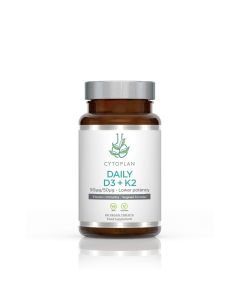Why is supplementing with vitamin D so important?
Vitamin D3 (cholecalciferol), a fat-soluble vitamin, is made by the action of UVB sunlight on the skin, and in the UK, Caucasian adults need around 13 minutes of midday sunlight exposure in summer to maintain healthy levels of vitamin D. People with darker skin have more melanin to protect their skin from sun damage, and as such would need to spend anywhere between 30 minutes to 3 hours in the sun to produce sufficient D3.
In the UK, sufficient UVB for vitamin D synthesis only occurs on sunny days, from around 10.00 to 15.00, April to September and over the winter months vitamin D levels typically fall by around 50%. Some food sources, such as oily fish, liver, eggs, and mushrooms provide a very modest amount of vitamin D, but supplementing with vitamin D, particularly in the winter months can be an effective way to prevent deficiency.
Here in the UK, vitamin D deficiency is extremely common, and you are at higher risk of deficiency, if you fall into one of the following groups:
- Over 65
- Pregnant or breastfeeding
- Have darker skin
- Obese and overweight
- Housebound or work night shifts
- Cover most of your skin when outside
Historically seen as a vitamin to support bone health, Vitamin D’s essential role in supporting immunity is also now becoming well known but it also has far-reaching impact on our health.
- Bone Health - Calcitriol (the active form of vitamin D) plays an essential role in maintaining and supporting adequate bone density and vitamin D deficiency is related to an increased risk of osteoporosis and osteomalacia as well as specifically leading to rickets, particularly in children.
- Immune Health - Vitamin D can modulate both the innate and adaptive immune responses. Deficiency in vitamin D is associated with increased autoimmunity as well as susceptibility to infection.
- Hormonal Health - As a hormone, vitamin D also can elicit significant influence over other areas of the endocrine system such as parathyroid hormone, testosterone and oestrogen, as well as dopamine and serotonin. Adequate vitamin D levels can support both male and female fertility.
- Cardiovascular Health - Low serum vitamin D levels have been associated with an increased risk of hypertension, atherosclerosis, dyslipidaemia, metabolic syndrome and cardiovascular disease.
- Mood - Vitamin D can have a positive effect on both mood and sleep, possibly through its ability to influence serotonin levels.








